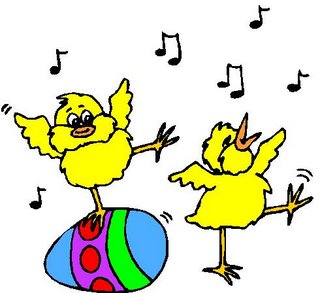24.3.06
LEZIONE 22, 29 MARZO 2006

LESSON PLAN
OBJECTIVES:
- Shopping for clothes and shoes
- Getting the right size
- Saying what colour you would like
Abbigliamento e calzature: Italianissimo p.31
Vorrei un paio di pantaloni neri I would like a pair of black trousers
Che taglia porta? What size are you? (clothes)
La taglia 42
Che numero porta? What size are you? (shoes)
Posso provare questa camicia? Can I try this shirt on?
E' troppo grande/piccola It's too big/small
E' troppo larga/stretta It's too large/small
E' troppo lunga/corta It's too long/short
Avete una taglia piu' grande/piccola? Do you have a bigger/smaller size?
Avete un numero piu' grande/piccolo?
Avete altri colori? Do you have it in any other colours?
Queste scarpe sono molto comode These shoes are very comfortable
FIND BELOW SOME USEFUL LINKS TO PRACTISE AND CONSOLIDATE WHAT YOU LEARNED THIS WEEK
http://web.uvic.ca/hispanital/italian/italian100/vocab/colori.htm (learn Italian colours)
http://www.languageguide.org/im/clothes_men/it/ (men's clothing. Very good to build your vocabulary)
http://www.languageguide.org/im/clothes_women/it/ (women's clothing. Very good to build your vocabulary)
http://www.bbc.co.uk/languages/italian/lj/clothes/index.shtml
http://www.italica.rai.it/lingua/corso.htm (click on CORSO ELEMENTARE > ENGLISH > CHOOSE THE STYLE > AL MERCATO, then try to listen to the dialogue without reading. After that go back to the previous page and click on IN UN NEGOZIO DI SCARPE, listen to the dialogue and then click on EXERCISES. Try to complete them all.)
Buona Pasqua a tutti. Ci rivedremo il 19 aprile!

17.3.06
LEZIONE 21, 22 MARZO 2006
OBJECTIVES:

- Asking for items in a shop
- Understanding prices in euro
- Saying you will take it
1) Desidera? Mi dica.. Can I help you? Italianissimo p.66, 68
Mi da' un francobollo per la Gran Bretagna? Can I have a stamp for
Britain?
Avete giornali inglesi? Have you got English newspapers?
2) Quanto costa la cartolina? How much is the postcard? Italianissimo p.68
Quanto costa? How much does it cost?
Quant'e' ? How much is it?
3) Lo compro! I'll take it, I'll buy it!
4) I prezzi in euro:
€ 1,00 un euro € 2,00 due euro € 4,20 quattro euro e venti
€ 0,01 un centesimo € 0,15 quindici centesimi € 100,00 cento euro
5) Compito per casa: esercizi
FIND BELOW SOME USEFUL LINKS TO PRACTISE AND CONSOLIDATE WHAT YOU LEARNED THIS WEEK
http://www.bbc.co.uk/languages/italian/quickfix/shopping.shtml
http://www.bbc.co.uk/languages/italian/lj/essentials/index.shtml
http://www.italica.rai.it/lingua/corso.htm (click on CORSO ELEMENTARE > ENGLISH > CHOOSE THE STYLE > BY SITUATION > IN UN NEGOZIO DI DISCHI, then listen to the dialogue. After that go to AL MERCATO click on EXERCISES and try to do all the exercises)
11.3.06
LEZIONE 20, 15 MARZO 2006

LESSON PLAN
OBJECTIVES:
Reserving a hotel room
Using months of the year
Spelling your name in Italian
1) Vorrei una camera I would like a Italianissimo p.66
singola single room
doppia: double room:
matrimoniale
a due letti twin-bedded room
2) Per/ una notte
tre notti
una settimana
dal 10 al 17 luglio
3) I mesi dell'anno (Months of the year) Italianissimo p.241
4) Come si scrive il tuo nome? How do you spell your name?
L'alfabeto italiano (Italian alphabet) Italianissimo p.6
5) Compito per casa: Esercizi
MARIA: emme (M) a (A) erre (R) i (I) a (A)
FIND BELOW SOME USEFUL LINKS TO PRACTISE AND CONSOLIDATE WHAT YOU LEARNED THIS WEEK
http://www.bbc.co.uk/languages/italian/quickfix/accommodation.shtml
http://web.uvic.ca/hispanital/italian/italian100/prelim/index.htm (go to I GIORNI DELLA SETTIMANA and then STAGIONI E MESI)
6.3.06
LEZIONE 19, 8 MARZO 2006
OBJECTIVES:
Describing your weekly routine
Saying how often you do things
Saying what job you do
1) I giorni della settimana (Days of week) Italianissimo p.241
2) Che cosa fai durante la settimana? e.g. :
- il lunedí lavoro
- il martedí lavoro
- il mercoledí vado a lezione di italiano
- il giovedí lavoro
- il venerdí faccio la spesa
- il sabato faccio le pulizie e vado in palestra
- la domenica esco, a volte vado al cinema o al ristorante
3) Phrases expressing frequency Italianissimo p.61 v-vi
- Quanti giorni alla settimana lavori?
- Lavoro tre giorni alla settimana
- Che lavoro fai?
- Faccio il meccanico
- Faccio lo psicologo
- Faccio l'infermiera
- Faccio la cameriera
5) Compito per casa: Esercizi
FIND BELOW SOME USEFUL LINKS TO PRACTISE AND CONSOLIDATE WHAT YOU LEARNED THIS WEEK
http://www.bbc.co.uk/languages/italian/lj/jobs/index.shtml
http://academic.brooklyn.cuny.edu/modlang/carasi/site/lessons/lesson10/10pagethree.html
http://academic.brooklyn.cuny.edu/modlang/carasi/site/lessons/lesson04/pageone.html
5.3.06
LEZIONE 18, 1 MARZO 2006

LESSON PLAN
OBJECTIVES
Using reflexive verbs to talk about your daily routine
Saying at what time these actions take place
A verb is reflexive when it expresses an action that refers back to the subject e.g.
Mi lavo (lit. I wash myself) Mi riposo (lit. I rest myself). You can recognize a reflexive verb (sul dizionario) by looking at the infinitive form. If the syllable of the infinitive is -si (oneself), then the verb is reflexive. When you conjugate a reflexive verb you must change the last syllable -si with -mi (myself) -ti (yourself) etc. : Lavarsi (to wash oneself) Mi lavo, ti lavi, si lava etc.
See Italianissimo p.85, 87, 56 (What's it like?)
Attenzione: do not assume every verb that describes your daily routine is reflexive
Faccio la colazione (I have breakfast)
Vado al lavoro (I go to work) etc.
Compito per casa (Homework): in classe describe your daily routine and say what you do for living.

